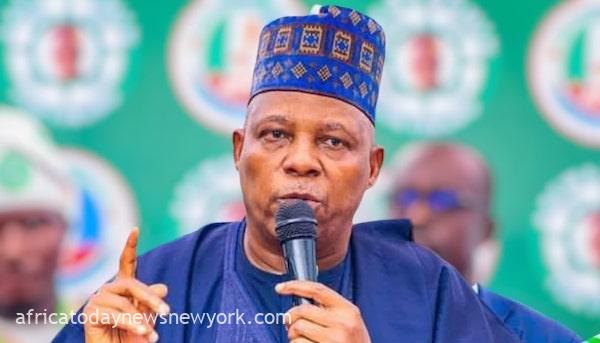The Vice President of Nigeria, Kashim Shettima has asserted that with the removal of fuel subsidy, Nigeria is projected to save about 15 million tonnes of carbon dioxide emissions in one year.
Shettima made this known at the one-day workshop organised by the National Council on Climate Change with the theme ‘Unpacking the outcomes of the 58 sessions of the subsidiary bodies of the United Nations framework convention on climate change,’ organised by the National Council on Climate Change.
Shettima, who was represented by his Deputy Chief of Staff, Senator Ibrahim Hassan, pointed out that Nigeria was on course to achieve the nationally-determined contribution targets.
Read Also: N’East Insurgency: Beyond Military Solutions, Shettima Says
‘At the onset of this administration, President Bola Tinubu took the bold step to put an end to the petrol subsidy. Preliminary analysis conducted by the National Council on Climate Change on the co-benefits of fuel subsidy removal indicates that there has been about a 30 per cent reduction in daily fuel consumption, amounting to about 20 million litres, equivalent to an estimated daily saving of 42,800 tonnes of carbon dioxide emissions.
‘When projected over one year, it amounts to over 15 million tonnes of CO2 saved, representing about 40 per cent greenhouse gas reduction from the baseline projection of 45 million metric tonnes of total GHG carbon dioxide equivalent by 2030. This places Nigeria on course to achieve our NDC targets ahead of time,’ he said.
In his welcome address, the Director General of the NCCC, Dr Salisu Dahiru, said there was a need for Nigeria to prepare adequately for COP28 and other statutory meetings.
Recall that Shettima had last week highlighted the inadequacy of a purely military response in resolving the Northeast insurgency, advocating for a balanced approach that incorporates both military and non-military strategies.
The Vice President further disclosed that the Bola Tinubu administration intends to introduce a comprehensive initiative in the near future, targeting the intertwined challenges of insurgency, poverty, and other hardships confronting citizens, particularly those in the northern region.
Speaking with journalists on Sunday during his condolence visit to Kano, the Vice President made this assertion.

